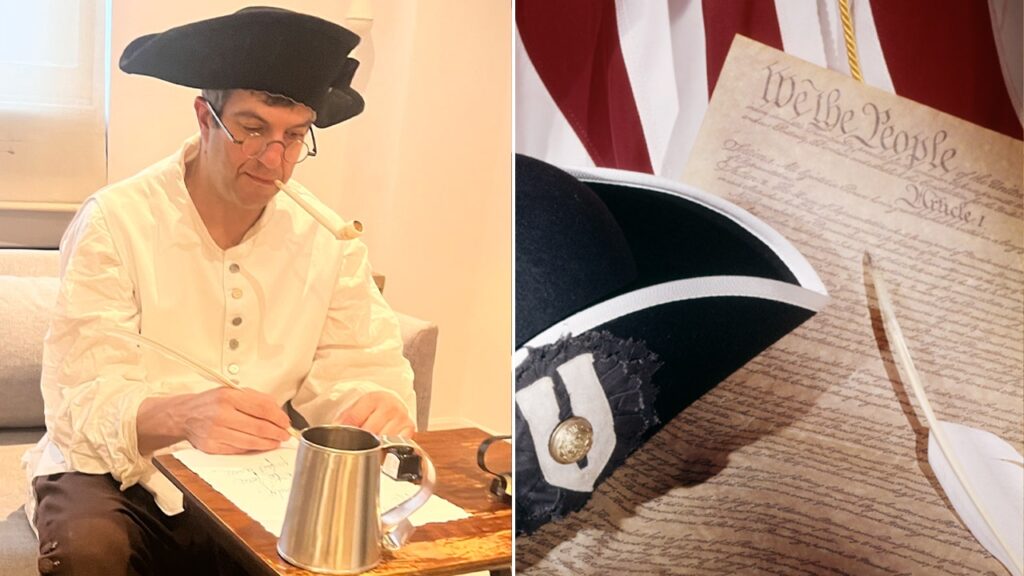In an intriguing endeavor, a man from New York City undertook the challenge of immersing himself in the lifestyle and principles of the Founding Fathers for an entire year. This experience involved not only a rigorous adherence to constitutional values but also an exploration of traditional practices, including the art of writing with a quill pen. Crafted from a carefully trimmed goose feather and dipped in ink, this quill served as both a tool and a symbol of a bygone era. While the act of writing conventionally may seem a simple task, he found that using the quill profoundly affected his thought processes and creativity, illuminating insights about contemporary life.
With the quill pen came inevitable challenges. The writer noticed that his writing space became a canvas of ink stains, reminiscent of a Jackson Pollock painting, and his spouse was less than thrilled with the persistent squeaking sound each time the quill touched the parchment. Despite these minor inconveniences, the experience was transformative, leading to a more deliberate and contemplative approach to writing. Unlike the rapid-fire typing one might succumb to on a laptop, longhand writing induces a unique state of flow that encourages deeper thought. In today’s fast-paced digital world, distractions abound, from incessant notifications to tempting pop-up advertisements; writing by hand negates these interruptions, allowing for sustained focus.
This method of writing resonates with the mindset of the Founding Fathers, who thrived on reasoned discourse over impulsive reactions—what we might now call “hot takes.” In their time, the immediacy of communication was replaced with patience. They meticulously composed letters, sealed them with wax, and delivered them to post offices, ensuring a cooling-off period that encouraged thoughtful reflection prior to sharing ideas. The contrast with today’s instant messaging and social media, where a hasty response is only a click away, serves as a reminder that modern communication often lacks the depth and consideration of the past.
While the thought of reverting entirely to quill pens and wax seals might seem impractical, there lies a significant value in advocating for more offline writing and reflection in our current technological landscape. Even simple tools like modern pens and pencils can promote a productive thinking process. Scientific studies underline the cognitive benefits associated with handwriting, suggesting that the controlled movements of writing by hand enhance brain connectivity, ultimately aiding memory retention.
For those unable to embrace longhand writing consistently, there are still methods to cultivate deeper thinking. For instance, using software like Freedom disables internet access for a predetermined duration, allowing individuals to compose their thoughts without the constant lure of online distractions. Engaging in this practice can lead to more thoughtful email responses or social media interactions. By composing these thoughts offline, the author emphasizes the importance of revisiting and revising one’s work, often resulting in a more measured and constructive tone that promotes resolution.
The author encourages readers to reflect upon the original context in which the United States Constitution was crafted. The delegates did not have the instant messaging capabilities that dominate modern communication; they took their time, engaging in deliberative discourse that ultimately shaped the foundation of the nation. Imagining James Madison or Alexander Hamilton attempting to draft the Constitution through a Google document makes it clear that the gravity of that task required a level of care and consideration that is often lost in today’s fast-paced environment.
In conclusion, while forward motion is essential for progress in our technologically advanced society, taking a step back to embrace slowness—especially in writing and thinking—can yield substantial benefits. As A.J. Jacobs notes in “The Year of Living Constitutionally,” there exists a balance to be struck between the conveniences of modern life and the timeless wisdom of the past. Through a deliberate and thoughtful approach, individuals can cultivate richer discussions and deeper understanding, resonating with the principles that the Founding Fathers held dear so many years ago. Thus, the journey to rediscover the value of measured thought and traditional writing methods can enhance not only personal reflection but also civic discourse in an increasingly polarized world.



